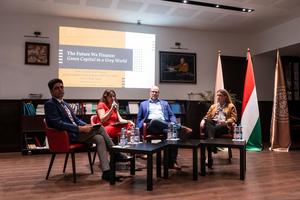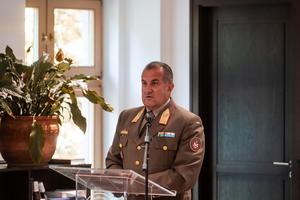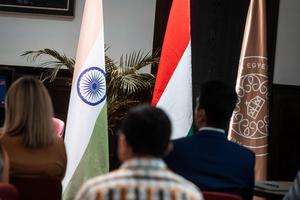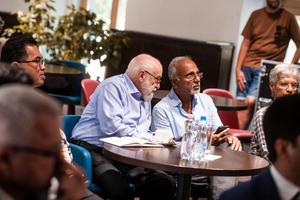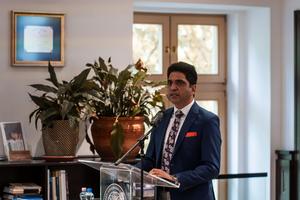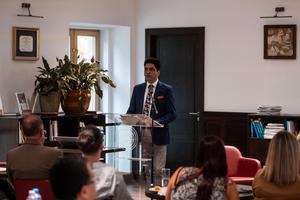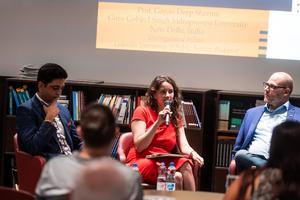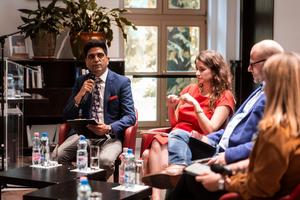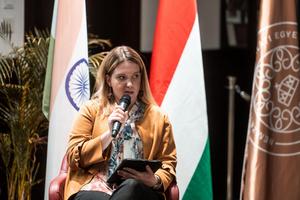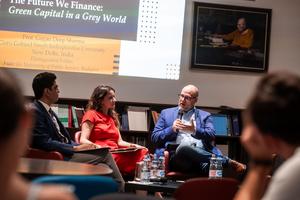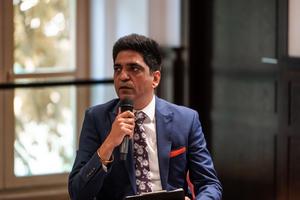Under this title, the International Directorate-General organized a professional forum, held as part of the Ludovika Public Diplomacy Hub. This flagship initiative of our university strengthens Hungary’s international presence and creates a platform for meaningful dialogue on global issues. By inviting renowned international fellows—whether for lectures, debates, or mentoring—it offers direct insights into global perspectives while contributing to public discourse on today’s most pressing challenges.
At the event, Professor Gagan Deep Sharma gave a lecture on how sustainable financial decisions can become drivers of change. The subsequent roundtable discussion brought together experts to exchange views on green financial instruments, climate-related decision-making, and the opportunities and limitations of a truly just green transition.
In the wake of climate crises and economic uncertainty, the global financial system faces a decisive question: who will finance the future, and whose future will be financed? On September 9, in the John Lukacs Lounge, experts examined the intersections of green capital, sustainability, and global inequalities—with particular focus on emerging economies and the Global South.
The event was opened by Major General László Kovács, Vice-Rector for Science at Ludovika University of Public Service. He spoke about Hungary’s role as a bridge between East and West, which includes developing transport corridors, digital infrastructure, and energy networks that support resilience and sustainability. Beyond these technical elements, connectivity also means building relationships based on mutual trust, recognition, and shared values, he added. Referring to Indian-Hungarian relations, the Vice-Rector underlined that both countries share a common vision of a multipolar and inclusive world order—making today’s event especially timely. The green transition, he noted, requires major investments, innovative financial tools, and new governance structures. For states of the Global South, the dual challenge is to secure financing for sustainable infrastructure while aligning it with local needs. He expressed confidence that Professor Gagan Deep Sharma’s lecture would provide valuable guidance on how to find solutions that are both environmentally responsible and economically viable.
In his keynote address, Gagan Deep Sharma, Associate Professor at Guru Gobind Singh Indraprastha University and Deputy Director of the Directorate of International Affairs, gave an overview of the role of sustainable finance in emerging economies, highlighting key challenges, innovative solutions, and possible future directions. (A detailed report on his lecture is available in a separate article on ludovika.hu.)
The roundtable following the lecture featured Professor Sharma alongside Liliana Śmiech, Director-General for International Affairs at LUPS, and Géza Sebestyén, Head of the Economic Policy Center at Mathias Corvinus Collegium. The discussion was moderated by Blanka Kovács, Policy Advisor at the State Secretariat for Circular Economy and Climate Policy of the Ministry of Energy.
The experts agreed that education is key. If people understood that returns on green investments are no lower than on traditional ones, many more would embrace them. Governments, they emphasized, have the responsibility to promote this kind of education. Broader societal engagement could accelerate the green transition dramatically.
Text: Lilla Kovács
Photo: Dénes Szilágyi
